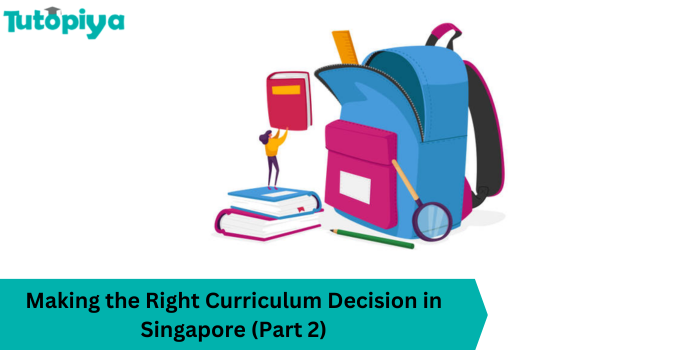
Part 1.2: Making the Right Curriculum Decision in Singapore
Series Introduction
In this second installment of our series, we focus on guiding you through the decision-making process to select the best curriculum for your child in Singapore. We aim to provide straightforward advice and practical steps to ensure you choose the educational path that best aligns with your child’s needs and your family’s aspirations.
Must Read: Education in Singapore: Everything an expat needs to know
Affordable and Convenient Education Options
Considering cost-effective education options is crucial for many families. Homeschooling and becoming a private candidate are viable choices that offer flexibility and customization to meet a child’s unique educational needs. Tutopiya supports these alternatives by providing high-quality resources and guidance, ensuring students receive a robust education at a lower cost.
Must Read: Homeschooling in Singapore: A Complete Step by Step Guide
Community and Extracurricular Opportunities
The Role of Extracurricular Activities in Education
Extracurricular activities extend learning beyond the classroom, helping to build essential skills such as teamwork, leadership, and time management. For example, students engaged in debate clubs gain enhanced speaking and analytical skills, which are invaluable across all areas of life.
How Schools Integrate Community Interaction
Community projects are integral to learning in many international schools in Singapore. These projects not only teach students about local and global issues but also foster a sense of civic responsibility. For instance, students might collaborate on environmental projects or community service initiatives, gaining hands-on experience in problem-solving and project management.
Must Read: 9 Best Private Schools in Singapore For Your Child
The Decision-Making Process
Step-by-Step Guide to Choosing the Right Curriculum
Identify Your Child’s Needs: Start by understanding your child’s academic and personal needs. What learning environment do they thrive in? What are their academic strengths and interests?
Research and Shortlist Schools: Evaluate schools based on how well they cater to your child’s needs, looking beyond just academic rankings to consider aspects like support services and extracurricular opportunities.
Visit Schools: Personal visits can provide deeper insights into the school’s culture and the effectiveness of its curriculum. It allows you to observe firsthand the interaction between students and teachers, and how the curriculum is implemented in daily activities.
Evaluate Flexibility and Support: Consider if alternative education paths like homeschooling, supported by Tutopiya’s resources, could better serve your child’s learning style and your family’s lifestyle.
Assessing Future Opportunities
It’s vital to consider the future opportunities a curriculum could open up for your child. Look at alumni success stories and where graduates typically proceed for higher education or career paths. This can provide a clear indicator of how well the curriculum prepares students for real-world challenges and opportunities.
Feedback from Other Parents
Gathering feedback from other parents and students who have experienced the curriculum can provide invaluable insights that are not always apparent through official statistics or school presentations. This real-world feedback can help you make a more informed decision about whether a school and its curriculum are the right fit for your child.
Must Read: Choosing the right international school in Singapore (Part 1)